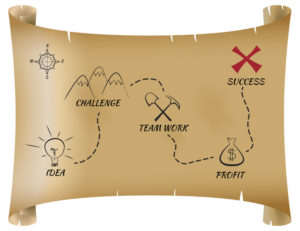[embedyt] http://www.youtube.com/watch?v=S0jWUC_oJig[/embedyt]
Why Your Attitude Matters
Although skill, ability, and having the right opportunity seem to be stepping stones to success, the one game-changing quality that makes the biggest difference is a person’s attitude. A person’s attitude will determine their altitude in achieving success. If someone needed a tiebreaker in determining the best-qualified candidate for the position, the selection would come down to a person’s attitude. Your attitude is how you approach life.
“Life is 10 percent what you make it
and 90 percent how you take it.”
― Irving Berlin
Attitude Awareness
Attitude is one of the most important predictors of your success. Your perspective on life will determine how you cope with trials and triumphs of life. Your attitude awareness impacts your thoughts and how you feel. How you feel you translate into your actions.  If you are feeling positive and upbeat, you are more likely to greet people with a compliment or a simple, “Good Day!” instead of responding negatively, “What makes it a good day?” People are attracted to positive energy; they want to be around people who uplift them and make them feel good about themselves and the world around them.
If you are feeling positive and upbeat, you are more likely to greet people with a compliment or a simple, “Good Day!” instead of responding negatively, “What makes it a good day?” People are attracted to positive energy; they want to be around people who uplift them and make them feel good about themselves and the world around them.
When you recognize the attitude that you are portraying, you can adjust it accordingly when you notice that it’s tending to the negative. Negativity as well is positivity can permeate the environment around you. As a leader, you want to ensure that you bring forth a positive attitude so that the people who follow you do so in turn. This impacts the people that you serve not only each other but who you’re ultimately there for.
Attitude Determines Your Resiliency
Your attitude is a foundation to your success. Although we would love for life to stay at the all-time high, we know that everyone in life faces challenges. It is how we move through that challenge that makes the difference. Attitude is a choice. Sometimes you may forget that you have a choice as to what attitude you wish to have. When you realize that you have a choice, you can then get on the right track. You become more resilient when you choose a positive outlook because you will be open to possibility and opportunity. If you choose to have a negative outlook on life you will be inclined to focus on problems, not solutions. Seeing the possibilities encourages creativity and innovation and allows you to move through challenges more quickly.
Attitude Conquers Fear
 Developing a positive attitude means that you are developing an attitude that is stronger in faith than the fear. When people make decisions or take actions based on fear, they often make the wrong choices and do not get the results or outcomes that they hoped for. When you are able to maintain a positive attitude, you are not driven solely on the emotion you are able to look at facts, and you’re able to think clearly about what direction you want to take. Your attitude will determine how persistent you will be in the face of obstacles and you will be able to trust yourself and your ability to move through them. You have faced obstacles before. Think about the patterns and your approach to how you face those obstacles in the past. They will help you determine some of the actions that you need to do moving forward when making decisions or taking the next steps. Be open to new information that will support you in reaching the outcomes you want to achieve. Let your faith in yourself and your people be stronger than the fear of uncertainty or failure.
Developing a positive attitude means that you are developing an attitude that is stronger in faith than the fear. When people make decisions or take actions based on fear, they often make the wrong choices and do not get the results or outcomes that they hoped for. When you are able to maintain a positive attitude, you are not driven solely on the emotion you are able to look at facts, and you’re able to think clearly about what direction you want to take. Your attitude will determine how persistent you will be in the face of obstacles and you will be able to trust yourself and your ability to move through them. You have faced obstacles before. Think about the patterns and your approach to how you face those obstacles in the past. They will help you determine some of the actions that you need to do moving forward when making decisions or taking the next steps. Be open to new information that will support you in reaching the outcomes you want to achieve. Let your faith in yourself and your people be stronger than the fear of uncertainty or failure.
“We cannot change our past… we cannot change the fact that people will act in a certain way. We cannot change the inevitable. The only thing we can do is play on the one string we have, and that is our attitude. I am convinced that life is 10% what happens to me and 90% of how I react to it. And so it is with you… we are in charge of our Attitudes.”
― Charles R. Swindoll
The attitude that you choose to have can take you on the ascent of new heights or can pull the rug from under you and descend you to the beginning. Your attitude is a choice. A choice to rise above any challenges you face and to persevere knowing that you will achieve what you go after.
DEBRA KASOWSKI, BScN CEC is an award-winning best-selling author, transformational speaker, blogger, and Certified Executive Coach. She has a heart of a teacher and is certified in Appreciative Inquiry and Emotional Intelligence. Debra is the host of The Millionaire Woman Show podcast focusing on helping people live rich from the inside out through leadership, business, and human potential. Her writing has been published in a variety of print and online magazines. Debra Kasowski International helps executives, entrepreneurs, and organizations boost their productivity, performance, and profits. It all starts with people and passion. Sign up the Success Secrets Newsletter and get your free mp3 download today! www.debrakasowski.com
Why Aren’t There More Goal Diggers in the World?
“You were born to win, but to be a winner you must plan to win, prepare to win, and expect to win.” ― Zig Ziglar
Everyone has a goal or dream. The goal is something that you want to accomplish or do, become, or have. The goal is an intention. Intentions are wonderful but without a plan of action they’re meaningless. We often hear people talk about some of their goals and dreams or organizational strategies however not everyone takes the time to plan and prepare to execute and make things happen.
Excuses, objections, and reasons for not pursuing goals are numerous.
Time Some people will tell you that they don’t have enough time. We all have the same 24 hours in a day it is how we allocate that time. I remember when I decided to go after my graduate certificate in executive coaching that I questioned the amount of time I had available. I knew I needed to block off every Wednesday from 5-7 p.m. that time was dedicated to online classroom and working with my team. I realized that what I had to drop off my children to their activities an hour before it the start time that I had time to sit and do my readings or go to the gym instead of visiting and sometimes getting drawn into gossip. It ended up that it was better that I walked away from those conversations and focused on what I was doing. At the end of the program, I realized that I had this extra time on my hands which I thought I didn’t have before. When you block or allot time to something and maintain that commitment you can get things done and your results will be because of the compound effect of your efforts.
Money When discussing goals you will often hear people talk about how they don’t have enough money to invest in themselves. What I have observed is they have money for the daily cup of coffee or tea, lunches, the latest outfits, or vacation. Pay attention to what you spend on groceries and the gas your spending when you’re running errands. There may be ways where you can organize your lists and your errands so that there are ways to save you money. When you have a goal in mind sometimes you need to sacrifice what you want but you’re not willing to do so. Part of this resistance is that it requires you to change the way you do things. Many of the things that you currently do are due to habit. When you start becoming aware of where your money is coming and going, you start to recognize ways in which you can improve your situation and start putting money aside to goals.
Smarts and Resources There’ll also be those people who tell you that they don’t believe they’re smart enough or don’t have the resources available to go after their goal. It may be that someone has told him that the goal that they have is not reasonable. I believe if you know you need to do something with your whole heart that you will find a way to achieve it. The most successful people in the world don’t know everything but they know where to find the answers that is what makes them truly successful. They’re not afraid to ask for what they need or for help when necessary. That is where true smarts come from.
Where I see a lack is that people are not clear on what it is they want to do. They lack intention. Without intention, you can’t make a plan and prepare to take action. People are overwhelmed by the variety of choices that they don’t always stop and take inventory or truly assess where they are at in their lives. This is often referred to as the midlife crisis and it can occur at any time. For some people, they suddenly evaluate their life and realize that they’re not doing the things that they thought that they would be doing. They ask themselves, “Is this what I want?”
I want to encourage you to be a gold digger. Someone goes after what they say they want. When is the right time you ask? The right time is now. Don’t wait for someone to fulfill one of your dreams or goals. What you want is in your hands.
Goal diggers set goals. They think about what outcome or desired result that they want to achieve. They use this as a target. This part it helps improve their focus and provide direction. When they focus on this target they are better able to make decisions and take actions to move toward what they wish to achieve. When people set goals they actually deepen their commitment to what they say they want to do. I actually writing down your goals and breaking it down into smaller pieces and tracking the progress of your goal you will start seeing evidence of getting closer to your target and this will create a momentum and motivate you to work toward what you said you wanted to achieve. Goal diggers will sometimes declare their goal on social media or they’ll hire a coach or find an accountability partner. When you have someone to be accountable to, you are more likely to push yourself and achieve more. By tracking and checking your progress and paying attention to numbers you become more informed and make better decisions.
The reason why there are not more goal diggers in the world is because many are afraid to fail and some may not want to put in the effort. It is not just the destination is the journey that you take to get there that will be the most meaningful and fulfilling. Imagine how satisfying it will be when you reach your goals. If you’re not going to do it now, when will you do it? There is never a right time other than the present moment. Seize your goal digging opportunity.
DEBRA KASOWSKI, BScN CEC is an award-winning best-selling author, transformational speaker, blogger, and Certified Executive Coach. She has a heart of a teacher and is certified in Appreciative Inquiry and Emotional Intelligence. Debra is the host of The Millionaire Woman Show podcast focusing on leadership, business, and human potential. Her writing has been published in a variety of print and online magazines. Debra Kasowski International helps executives, entrepreneurs, and organizations boost their productivity, performance, and profits. It all starts with people and passion. Sign up the Success Secrets Newsletter and get your free mp3 download today! www.debrakasowski.com
How Successful Businesses and Organizations Avoid Common Pitfalls

When people feel pressured by the economic times, they are often doing more with less. They can fall into common pitfalls that can be avoided. They have a number of issues and concerns that absorb the majority of their time and because of they are multi-tasking many important things some things that need to be dealt with getting pushed aside and lead to larger problems later on, such as dealing with conflict or tracking results. They tend to be short on time and feel that they have limited resources and because of this they become short-sighted and only think short term. They fail to recognize that everything that they need is within their reach.
You might think that this is a big claim; however, by using a positive approach to change called Appreciative Inquiry businesses and organizations can get more creative in how they approach uncertainty and the change process. Appreciative Inquiry gives businesses and organizations the permission to dream and design an ideal future by tapping into their greatest resource – their people.
People come from all walks of life carrying with them different levels of knowledge, skills, abilities, and experiences. Imagine what would happen if you tap the into the best experiences and the richness of a person’s story and learn their strengths what that could do for your business or organization. Appreciative Inquiry uses a method of applying what people appreciate and from this, we can discover ways in which we can build it into our current existence and work toward the preferred future.
 The process creates a vision for people to believe in and they will have a vested interest in helping your business or organization grow and achieve its goals. This approach gives people an opportunity to participate and engage in a whole new way. This is an opportunity for all levels of an organization to work together and learn together in pursuit of a common vision. Individuals want to believe they can be part of something so much bigger than their current everyday workload. Even though people are working with potentially fewer resources, appreciative inquiry gives them the opportunity to be creative and innovative with a new approach.
The process creates a vision for people to believe in and they will have a vested interest in helping your business or organization grow and achieve its goals. This approach gives people an opportunity to participate and engage in a whole new way. This is an opportunity for all levels of an organization to work together and learn together in pursuit of a common vision. Individuals want to believe they can be part of something so much bigger than their current everyday workload. Even though people are working with potentially fewer resources, appreciative inquiry gives them the opportunity to be creative and innovative with a new approach.
We can learn so much by asking positive questions. If people start to vent because they’ve had a poor experience, there is a lesson to be found. They obviously have the vision of what would be the preferred experience. By learning from this experience, and a new way of doing things can be discovered. Skeptics of appreciative inquiry may believe that because we are not focused on the weaknesses and threats facing businesses and organizations that we cannot achieve the greatness of our vision. However, as in positive psychology, you tend to get more of what you focus on. If your focus is on strengths, opportunities, aspirations, and results you will be much further ahead because that’s what you will be focused on.
Business and organizational leaders will learn that they don’t have to do everything by themselves and that their people can be trusted to carry through on the vision with their knowledge, skills, abilities, and most of all experiences. They don’t need to do everything by themselves and be the Lone Ranger. They can delegate to people who are skilled and have the expertise to carry through on projects. It is important for business and organizational leaders to have an understanding of how to do something but it does not mean they need to do it. They spend their time being the employee or the technician they are working in the business or organization versus on it and this will limit their growth. They need to be spending their time where their talents and efforts need to be placed in order for things to grow.
Take time to ask yourself what you appreciate. What are some of your best experiences? How can you learn from them? How would this help you avoid some of the common pitfalls that you catch yourself falling into? If someone gave you the permission to dream, what would you ask for?
DEBRA KASOWSKI, BScN CEC is an award-winning best-selling author, transformational speaker, blogger, and Certified Executive Coach. She has a heart of a teacher and is certified in Appreciative Inquiry and Emotional Intelligence. Her writing has been published in a variety of print and online magazines. Debra Kasowski International helps executives, entrepreneurs, and organizations boost their productivity, performance, and profits. It all starts with people and passion. Sign up the Success Secrets Newsletter and get your free mp3 download today! www.debrakasowski.com
Why are You Stalling? Get Out of Your Own Way
[embedyt] http://www.youtube.com/watch?v=gpDKbWVeZWo[/embedyt]